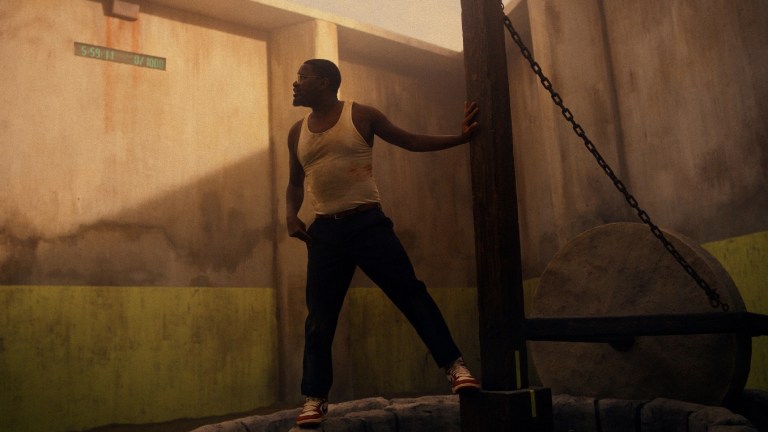The Mill Ending: Joe’s Neighbor Alex Is the Real Cautionary Tale
Hulu's The Mill really puts Lil Rey Howery's character Joe through it. Still, at least he has a friendly voice to keep him company.

This article contains spoilers
Hulu’s savage new original film The Mill offers a nightmare vision of corporate America controlled by algorithms that physically, mentally, and emotionally punish employees who don’t achieve their quotas. The movie doesn’t seem particularly far-fetched in 2023, despite its outrageous set-up, which is something that the filmmakers have acknowledged.
“When we filmed The Mill, these discussions were hypothetical. Our film unexpectedly became relevant. But it’s not just about AI or labor. Joe’s tale isn’t merely topical — it’s universal,” director Sean King O’Grady said of the movie. “It’s about feeling trapped in a system that takes more than it gives, feeling like a replaceable cog in a lifeless machine. Have you ever felt powerless or exploited in this way? Do you right now?”
Lil Rey Howery’s middle manager Joe is certainly powerless and exploited when he is transplanted from the clean, fifth floor offices of Mallard and into a dirty outdoor cell. Joe is degraded and threatened for an unknown amount of time, and ordered to push a heavy mill for 16 hours a day in the name of “advanced career training” that will make him “the best version” of himself.
Over the course of the film, Joe submits, fights back, tries to escape, and even attempts to rally the other employees into a united front against Mallard. He only has the demanding voice of the AI, an occasional food drop, and the horrifying screams of fellow employees who’re being “terminated” to break up his hours pushing the mill. But he does have some relatively friendly conversation from a mysterious man in the cell next to him, who he talks to through a vent in the wall.
Who Voices Joe’s Neighbor in The Mill?
Joe’s neighbor Alex is voiced by notable character actor Patrick Fischler. Previously, Fischler has fielded roles on an incredible range of movie and TV projects. You may remember him as the man who saw the nightmare apparition behind Winky’s restaurant in David Lynch’s 2001 masterpiece, Mulholland Drive. He later returned as Duncan Todd in Lynch’s Twin Peaks: The Return.
Fischler also played Jimmy Barrett in Mad Men, and Phil in Lost. His performance was captured for the character of Mickey Cohen for the hit video game L.A. Noire. Recently, you might have seen him pop up in Netflix’s The Lincoln Lawyer, Barry, and Billions.
The Cautionary Tale of Joe’s Neighbor
Joe’s unseen neighbor tells him that he’s been sent to The Mill because he’s “pissed off” Mallard. He refuses to give Joe his name for most of the movie, but he regularly dispenses helpful advice, telling Joe how to work the system as best he can. He says that The Mill is designed to show its denizens what they’re truly capable of, and how far they will go until they break.
Eventually, we find out that Joe’s neighbor is called Alex, and he used to push the mill in Joe’s cell before he got there. Alex was moved to a different cell after he managed to escape, having found a weak spot on the far wall where he could dig his way out. Alex also designed the original Mallard algorithm that made the company’s punishing system possible, and feels responsible for the impact it’s had on others.
Alex is a cautionary tale on a number of levels. He is the person who is aware of how capitalism steals our lives, yet helps make the system worse for everyone in exchange for money. This has exactly the same detrimental effect on his own life in the long run. He is also the person who has the temerity to quit their soul-sucking job, only to later find themselves right back in the system – just in a slightly different cell.
Towards the end of the movie, Alex knows acknowledges that he has wasted his life working for Mallard. His son hates him because he was always working and therefore never around. He has given up trying to escape the system, and has simply submitted to the grind. As he looks up at the stars on his last night in The Mill, he remarks that he could have been staring up at them the whole time, a metaphor for how beautiful his life could have been if he hadn’t made work his priority.
Though it’s ultimately unclear if Alex is a real fellow employee or just another part of the “training simulation”, he could also exist only in Joe’s mind – a cautionary voice he created within the simulation to help him avoid meeting the same fate as Alex. Through flashbacks, we see Joe let his pregnant wife down so he can focus on work instead, and he selects an expensive house for them to start their family in when his wife clearly doesn’t need those societal trappings.
In the end, Joe’s worst fear is that he will miss out on key time with his family to “push the mill” at Mallard, and in the movie’s final moments, Joe decides to burn Mallard down so he doesn’t end up like his friendly neighbor Alex.
